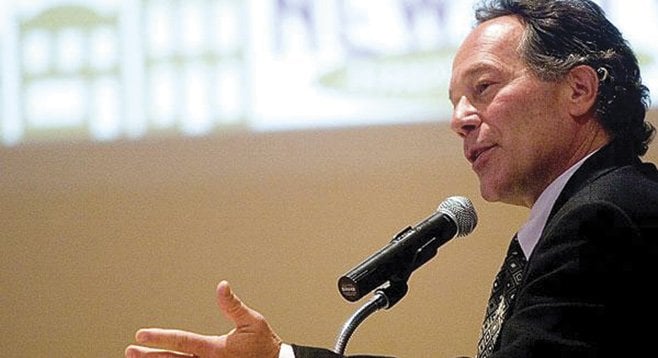See the Article in the San Diego Reader
Atkins pushes bill so 30% of your neighbors can redevelop you

Marco Li Mandri wants to change city law to make it easier to form assessment districts. He’s helped start 61 such districts around the country.
Marco LiMandri weeps elephant tears over end of assessment districts.
By Dorian Hargrove, April 1, 2014
Assembly Speaker-elect Toni Atkins [Editor's Note: That's right folks, she is now Speaker of the Assembly with the power to force bills through the Assembly! This Bill was withdrawn but it is still disturbing that it was even so tried. See the updated article HERE. Governor Brown wants his own redevelopment bill passed called JEDI] wants to make it easier for property owners to levy assessments on their neighbors property tax bills to pay for community improvements.
Last month, on February 21, Atkins introduced legislation aimed at tweaking California's Property and Business Improvement District Law by introducing Community Benefit Districts.
Community Benefit Districts are nearly identical to Property and Business Improvement Districts except for three major changes: The bill would reduce the number of property owners needed to establish an improvement district from 50 percent to 30 percent, as well as extend the life of the district from ten years to twenty years. Lastly, if passed the legislation would turn San Diego County into a testing ground for the Community Benefit Districts, meaning the law would not apply to any other county in California.Atkins' proposal is not a new idea. In fact, former-assemblymember Juan Vargas introduced similar bills in 2002 and 2005 and an identical bill which Vargas later pulled from consideration in 2012.
None have gone over so well.
In 2002, then-governor Gray Davis vetoed Vargas's first attempt, saying the "bill offers no compelling reason why the assessment period should be extended so significantly, or for why the percentage of property owners signing a petition in support of such a [Business Improvement District] is reduced from 50 [percent] to 30 [percent]. I am committed to the principles of smart growth and urban revitalization, but I do not believe that this bill provides the proper balance between these principles and those of fair and just taxation.”Ten years later Vargas still had trouble finding support for the law. In 2012 he pulled the bill amid complaints from lobbyist groups and labor unions who believed the law was unneeded and could potentially tarnish California's Property and Business Improvement Law.
The bill’s unreasonably low petition threshold of just 30 percent (as opposed to the 50 percent required for PBID formation) would allow a small number of property owners to initiate the district proceedings without obtaining consensus support from even a bare majority of impacted businesses," read a letter opposing Community Benefit Districts from a number of lobbyist groups including the California Business Properties Association, the California Building Industries Association, the California Retailers Association and others.Opposition to Vargas's law even came from nonprofit organizations which represent assessment districts. "The concern is that if you lower the petition threshold to 30 percent, you could foster a situation where a few large parcel owners could band together and force a district through the process without support of many small owners," wrote Kerry Morrison, executive director for Hollywood's property-based improvement district, in an April 2012 letter to Vargas.
"What the proponents do not reveal, however, is that the number of ballots typically returned is relatively small; hence the initial petition threshold is actually the more challenging hurdle in [business improvement district] formation."But the legislation, once thought dead, has risen again.
Maintenance assessment district-guru Marco Li Mandri came up with the concept of Community Benefit Districts and served as an adviser to Vargas and Atkins in writing the legislation.
Li Mandri says the legislation will correct flaws in the property and business improvement district law.
First and foremost, he says, the name is wrong. "It implies only 'business improvement' when in fact, all of our downtown and commercial areas are becoming mixed use and the majority of new development is not business oriented."
Other flaws says Li Mandri: "The five-year term, particularly in light of the end of redevelopment is far too short. Districts should last as long as property owners received tangible benefit. It should be their choice instead of a full employment act for formation consultants."
"Finally, the 50 percent petition threshold is unreasonably high and only favors districts with high concentration of property ownership. The petition doesn’t create the district, the balloting does. But many areas never get to balloting because they could not reach the petition threshold. The argument that it builds 'community support' is a farce. The high petition threshold forces districts into smaller boundaries and lower budgets because the threshold is so high. It makes no sense to require 50 percent of the weighted property owners to trigger a balloting when only 55 to 65 percent of property owners will even return their mail ballots."
Assemblywoman Toni Atkins' office did not reply in time for publication. The bill, since the amendment, is now headed back to the local government committee of the State Assembly.
----------------------
Atkins elected Assembly speaker
UTSanDiego

Summary SACRAMENTO San Diego Democrat Toni Atkins was elected Assembly Speaker Monday afternoon. She will be the first San Diegan and only the third woman to hold the post. "She has impressed me as someone with a true servant's heart - willing to take on the causes she believes in, fighting for the poor, the disenfranchised and the marginalized."
No comments:
Post a Comment